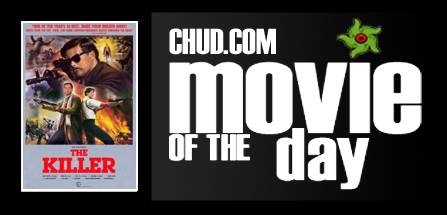
The Film: The Killer
Note: The only truly decent DVD of the film is, incredibly, not the Criterion disc. It’s actually the Fox Lorber/Winstar DVD release. This version is non-anamorphic, but has a decent image and subtitles that aren’t completely embarrassing. The French TF1 and the U.K. Hong Kong Legends discs are anamorphic – but are long out of print. Dragon Dynasty’s Blu Ray of the film is a horrid, DNR’d to Death, PAL-accelerated, interlaced mess – filled with strange flash frames and accented with a phony 5.1 mix.
The best the film has looked on home video is not much better than the above mentioned versions – it’s the Kam & Ronson Blu Ray. The transfer seems to be an SD upconversion, but it’s 1080p and seems to have been sourced from the least-damaged print I’ve ever seen of the film. This disc can be purchased here.
The Principles: John Woo (Director), Chow Yun-fat, Danny Lee, Sally Yeh, Big Sillyhead, Chu Kong
The Premise: A hired killer (Chow) blinds songstress Jennie (Yeh) during a dizzyingly elegant and excessively violent shootout in a nightclub. Feeling beholden to the woman, he enters her life trying to help her, and the two find love. His feelings for her are a weakness exploited by intense detective Li Ying (Lee), and by Wong Hoi – the dishonorable underworld figure who contracted the assassin (Big Sillyhead Shing Fui-On, who made a career out of playing disreputable sorts until cancer claimed him in 2009) to kill his own uncle, and now refuses to pay for the hit (the money would have funded Jennie’s ticking-clock eye surgery). When circumstances throw cop and criminal together (both of whom have come to see themselves as the chanteuse’s protector), the two men discover that, philosophically, they’re not so different – and they must brace themselves for an onslaught from Wong’s triad forces.
Is It Good: As a would-be film journalist, I’m often asked which film is my favorite. Anyone who loves movies as we do knows that this is a question that is impossible to answer. Maybe if you asked me what my one hundred favorite films in no particular order are, I could get back to you after a day or so of hand-wringing.
But when I’m forced to boil it down to a single film…I usually say it’s The Killer. So yeah, it’s good. It’s a film that sings to me it’s fatalistic, melodramatic siren song – instilling in those who love it the idea that we must do what is right even though there is no safety in it. Good will not prevail. Innocence and grace will not survive a cruel world, and once the cruelest among us see the error of their ways and attempt to atone – well, they might as well just stencil “Goose” on their helmets and make sure they’ve got clean anderweres on.
Still, in a nightmarish world of betrayal and profound sadness, Woo is still a people person. He believes that the most diametrically opposed among us can find common ground, that we can forgive and be forgiven. John Woo’s The Killer loves people and film in equal measure – and its desire to engage in mythmaking is born of Woo’s adoration of Shaw Brothers martial melodrama, the elegance of Jean Pierre Melville’s tales of romantic doom, and the murkiness of Martin Scorsese’s Mean Streets. Heroic swordsmen trade swaying fields for steel and glass, bushido pants for cotton suits and their Hanzo swords for pistols, but the result is still the same – buckles are swashed, love is found and lost, friends are found and betrayed and found again – and blood is spilled.
Is It Worth A Look: Of course it is. So often in film, “homage” is just code for “rip-off“ and pastiche is playing it safe by hitting familiar beats – but The Killer truly stands apart from its influences, becoming something profoundly influential in its own right. Nearly twenty-five years after its debut, it’s still utterly breathtaking.
Random Anecdotes: The film strained the relationship between John Woo and fellow HK filmmaker Tsui Hark. Woo was contractually forced to deliver a sequel to his 1986 trendsetter A Better Tomorrow, and when his film didn’t work the way Tsui wanted it to, he demanded it be recut. Woo’s subsequent tinkering further infuriated Tsui – who refused to finance this film, as well as projects that would eventually become Once a Thief and Bullet in the Head. According to John Woo’s producing partner Terence Cheng, Tsui did not want this film to be made.
The film’s score features music by Hong Kong composer Lowell Lo – but also quite a few tracks from James Horner’s score for Walter Hill’s Red Heat.
Cinematic Soulmates: Le Samourai, Mean Streets, Water Margin, Le Circle Rouge